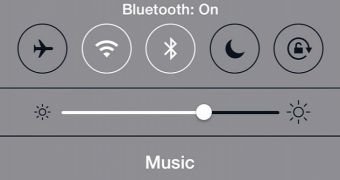Since iBeacon’s introduction in iOS 7 last year, Apple has started turning on Bluetooth by default with every subsequent update (i.e. iOS 7.0.3, 7.0.4, 7.0.6, 7.1), according to a new report.
Few people noticed this, or at least few of them bothered to actually mention their discovery in Apple’s forums. But Forbes reporter Kashmir Hill decided to take the matter up with Greg Sterling, a senior analyst at Opus Research who knows a thing or two about location marketing solutions like Apple’s iBeacon.
“It’s a critical piece here. Without Bluetooth, iBeacons won’t work,” he says. Indeed, the most plausible reason why Apple keeps turning on Bluetooth for users seems to be tied to iBeacon, which helps retailers “sense” the presence of a customer and market them products based on their needs.
Sterling says, “There’s a lot of excitement and a lot of momentum around building location sensing technologies out. The superficial angle is that retailers want lots of data about consumers, as if retailers are the NSA.”
However, the analyst is not concerned. If anything, he sees it as a new way for customers to get acquainted with a retailer’s offers and a more efficient way for the retailer to sell goods.
Some users are concerned that having Bluetooth turned on will drain their battery, but the reality is that the Bluetooth 4.0 specification is very low-power-consuming.
“The deeper reasoning is that retailers want to provide better experiences to customers, new tools for finding things in stores and helping them get more information about products. The challenge is to not screw it up by being too aggressive or too ham-handed in your implementation. You have to be respectful of privacy and permissions,” Sterling believes.
He even sees Apple turning iPhones into iWallets in the near future all thanks to iBeacon. Apparently, NFC (Near Field Communication) chips are not a requirement to get this done.
“This extends their whole ecosystem. If iBeacon becomes dominant or standard, it expands their reach and reinforces Apple and iOS usage,” says Sterling. “There’s also the idea that they may get into payments, which we’re seeing with Passbook.”
He points to the hundreds of millions of iTunes users who have credit cards on file at Apple: “... they could turn all that on, and iBeacon could be used for payment in stores rather than swiping credit cards.”
The analyst doesn’t care much for conspiracies and believes Apple has “a number of ideas about how the technology could be used,” mostly with a keen eye on shopping convenience.
Apple has been rumored for quite a while to be planning an entrance in the mobile payments business. CEO Tim Cook even hinted at this possibility at a recent meeting.

 14 DAY TRIAL //
14 DAY TRIAL //